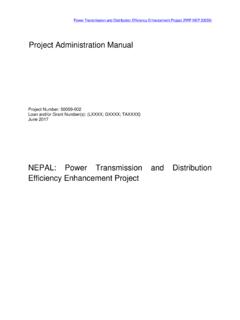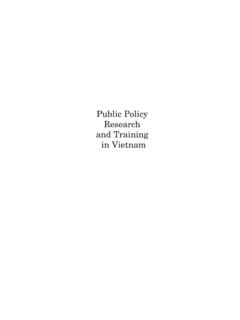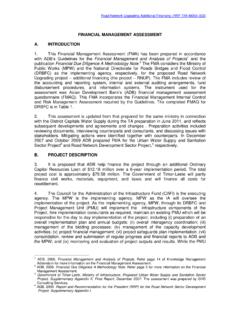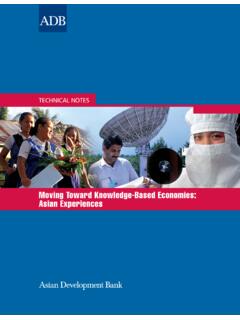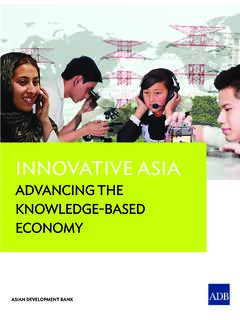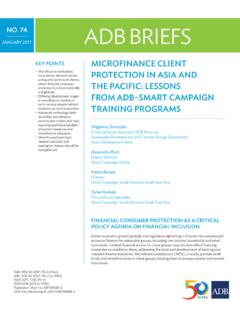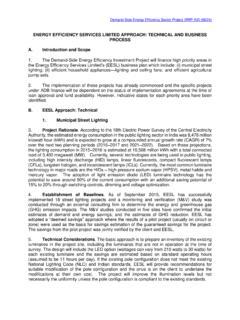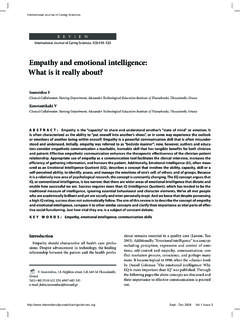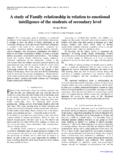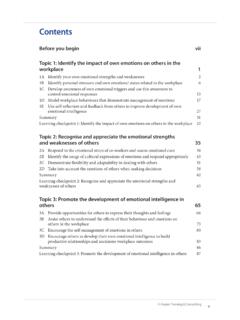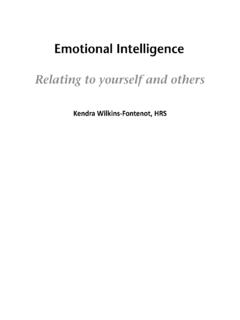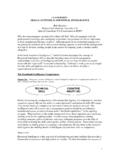Transcription of Understanding and Developing Emotional Intelligence
1 Knowledge SolutionsJune 2009 | 49 Emotional Intelligence describes an ability, capacity, skill, or self-perceived ability to identify, assess, and manage the emotions of one's self, of others, and of groups. The theory is enjoying considerable support in the literature and has had successful applications in many and Developing Emotional IntelligenceBy Olivier Serrat IntroductionThe Intelligence quotient, or IQ, is a score derived from one of several different standardized tests to measure It has been used to assess giftedness, and sometimes underpin recruitment. Many have argued that IQ, or conventional Intelligence , is too narrow: some people are academically brilliant yet socially and interpersonally And we know that success does not automatically follow those who possess a high IQ areas of Intelligence enable or dictate how successful we are. Toughness, determination, and vision help.
2 But Emotional Intelligence , often measured as an Emotional Intelligence quotient, or EQ, is more and more relevant to important work-related outcomes such as individual performance, organizational productivity, and Developing people because its principles provide a new way to understand and assess the behaviors, management styles, attitudes, interpersonal skills, and potential of people. It is an increasingly important consideration in human resource planning, job profiling, recruitment interviewing and selection, learning and development, and client relations and customer service, among When psychologists began to think about Intelligence they focused attention on cognitive aspects such as memory and problem As early as 1920, Robert Thorndike used the term social Intelligence to describe the skill of Understanding and managing other people.
3 In the 1940s, David Wechsler defined Intelligence as the aggregate or global capacity of the individual to act purposefully, think rationally, and deal effectively with his (or her) environment. In 1943, he submitted that non-intellective abilities are essential for predicting one s ability to succeed in life. Later, in 1983, Howard Gardner wrote about multiple intelligences and proposed that intrapersonal and interpersonal intelligences are as important as the type of Intelligence typically measured by IQ and related self-controlEmotionalexpressionPerforman ceDecisionsBehaviorEmotionsEmotionalself -awarenessEmotionalmanagement of othersEmotionalself-managementEmotionalr easoningEmotionalawarenessof othersFigure 1: An Emotional Intelligence Assessment Tool for the WorkplaceSource: Genos. 2009. Available: Solutions2 DefinitionEmotional Intelligence describes the ability, capacity, skill, or self-perceived ability to identify, assess, and manage the emotions of one s self, of others, and of groups.
4 People who possess a high degree of Emotional Intelligence know themselves very well and are also able to sense the emotions of others. They are affable, resilient, and optimistic. Surprisingly, Emotional Intelligence is a relatively recent behavioral model: it was not until the publication of Emotional Intelligence : Why It Can Matter More Than IQ by Daniel Goleman that the term became Developing their Emotional Intelligence individuals can become more productive and successful at what they do, and help others become more productive and successful too. The process and outcomes of Emotional Intelligence development also contain many elements known to reduce stress for individuals and therefore organizations by moderating conflict; promoting Understanding and relationships; and fostering stability, continuity, and harmony. Last but not least, it links strongly with concepts of love and ModelIndividuals have different personalities, wants, needs, and ways of showing their emotions.
5 Navigating through this requires tact and shrewdness especially if one hopes to succeed in life. This is where Emotional Intelligence theory helps. In the most generic framework, five domains of Emotional Intelligence cover together personal (self-awareness, self-regulation, and self-motivation) and social (social awareness and social skills) They are Self-Awareness (i) Emotional awareness: Recognizing one s emotions and their effects. (ii) Accurate self-assessment: Knowing one s strengths and limits. (iii) Self-confidence: Sureness about one s self-worth and capabilities. Self-Regulation (i) Self-control: Managing disruptive emotions and impulses. (ii) Trustworthiness: Maintaining standards of honesty and integrity. (iii) Conscientiousness: Taking responsibility for personal Emotional Intelligence draws from branches of behavioral, Emotional , and communications theories.
6 Goleman is the person most commonly associated with it. (But he is by no means the only researcher: the most distant roots of Emotional Intelligence can be traced to Charles Darwin s early work on the importance of Emotional expression for survival and adaptation.) Wayne Leon Payne is credited with first using the term Emotional Intelligence in 1985. Soon after, in 1990, John Mayer and Peter Salovey described that as the ability to monitor one s own and others feelings and emotions, to discriminate among them, and to use this information to guide one s thinking and actions. In 1997, their four branch model defined Emotional Intelligence as involving the abilities to perceive, accurately, emotions in oneself and others; use emotions to facilitate thinking; understand the meaning of emotions; and manage emotions. They also tried to develop a way to scientifically measure differences between people s abilities in the area of Nor surprisingly, perhaps, Goleman published Social Intelligence : The New Science of Social Relationships in 2006 to illuminate theories about attachment, bonding, and the making and remaking of memory as he examined how our brains are wired for altruism, compassion, concern, and rapport.
7 Good relationships nourish us and support our health, while toxic relationships can poison us. He proposed that social Intelligence is made up of social awareness (including empathy, attunement, empathic accuracy, and social cognition) and social facility (including synchrony, self-presentation, influence, and concern).5 The material that follows comes from the Consortium for Research on Emotional Intelligence in Organizations. 1998. Emotional Competence Framework. Available: have taught mankind to reason. Marquis de VauvenarguesIf your Emotional abilities aren t in hand, if you don t have self-awareness, if you are not able to manage your distressing emotions, if you can t have empathy and have effective relationships, then no matter how smart you are, you are not going to get very far. Daniel GolemanUnderstanding and Developing Emotional Intelligence3 (iv) Adaptability: Flexibility in handling change.
8 (v) Innovativeness: Being comfortable with and open to novel ideas and new information. Self-Motivation (i) Achievement drive: Striving to improve or meet a standard of excellence. (ii) Commitment: Aligning with the goals of the group or organization. (iii) Initiative: Readiness to act on opportunities. (iv) Optimism: Persistence in pursuing goals despite obstacles and setbacks. Social Awareness (i) Empathy: Sensing others feelings and perspective, and taking an active interest in their concerns. (ii) Service orientation: Anticipating, recognizing, and meeting customers needs. (iii) Developing others: Sensing what others need in order to develop, and bolstering their abilities. (iv) Leveraging diversity: Cultivating opportunities through diverse people. (v) Political awareness: Reading a group s Emotional currents and power relationships.
9 Social Skills (i) Influence: Wielding effective tactics for persuasion. (ii) Communication: Sending clear and convincing messages. (iii) Leadership: Inspiring and guiding groups and people. (iv) Change catalyst: Initiating or managing change. (v) Conflict management: Negotiating and resolving disagreements. (vi) Building bonds: Nurturing instrumental relationships. (vii) Collaboration and cooperation: Working with others toward shared goals. (viii) Team capabilities: Creating group synergy in pursuing collective brief, the five domains relate to knowing your emotions; managing your emotions; motivating yourself; recognizing and Understanding other people s emotions; and managing relationships, , managing the emotions of SkillsSelf-MotivationSocial AwarenessFigure 2: The Domains of Emotional IntelligenceI respect the man who knows distinctly what he wishes. The greater part of all mischief in the world arises from the fact that men do not sufficiently understand their own aims.
10 They have undertaken to build a tower, and spend no more labor on the foundation than would be necessary to erect a hut. Johann Wolfgang von GoetheSource: Solutions4 Table: The Personal and Social Attributes of Emotional IntelligenceCompetenceAttributeSelf-Awar enessEmotional AwarenessIndividuals with this competence Know which emotions they are feeling and why; Realize the links between their feelings and what they think, do, and say; Recognize how their feelings affect their performance; and Have a guiding awareness of their values and Self-Assessment Individuals with this competence are Aware of their strengths and weaknesses; Reflective, learning from experience; Open to candid feedback, new perspectives, continuous learning, and self-development; and Able to show a sense of humor and perspective about with this competence Present themselves with self-assurance and have presence; Can voice views that are unpopular and go out on a limb for what is right.
